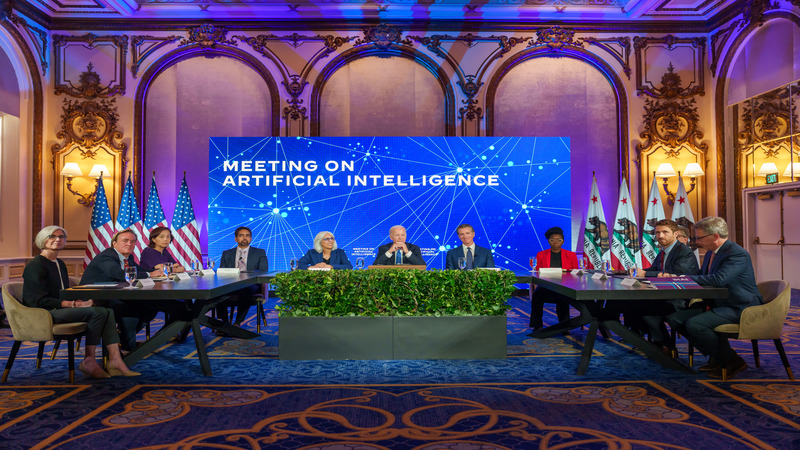
President Biden traveled to San Francisco Tuesday to meet with AI experts and researchers as part of a process to “rapidly develop decisive actions we can take over the coming weeks,” a White House official said in an announcement.
As one of several high-level meetings the administration has had on AI this year, Biden met with eight AI experts on June 20 regarding “seizing the opportunities posed by AI and managing the risks.”
“We’ll see more technological change in the next ten years than we’ve seen in the last 50 years, and maybe even beyond that. And AI is already driving that change in every part of the American life, often in ways we don’t notice,” Biden said to reporters ahead of the closed-door meeting in California.
“AI is already making it easier to search the Internet, helping us drive to our destinations while avoiding traffic in real time. AI is going to change the way we teach, learn, and help solve challenges like disease and climate change,” he said.
“But in seizing this moment, we need to manage the risks to our society, to our economy, and our national security,” Biden continued, adding, “My administration is committed to safeguarding America’s rights and safety, from protecting privacy, to addressing bias and disinformation, to making sure AI systems are safe before they are released.”
Biden also invited California Gov. Gavin Newsom and White House Office of Science and Technology Policy Director Arati Prabhakar to sit in on the meeting.
The tech leaders that participated in the discussion include:
- Tristan Harris, Executive Director and Co-founder of the Center for Human Technology;
- Jim Steyer, Founder and CEO of Common Sense Media;
- Rob Reich, Professor of Political Science at Stanford University;
- Joy Buolamwin, Founder of the Algorithmic Justice League;
- Fei-Fei Li, Co-Director of Stanford’s Human-Centered AI Institute;
- Oren Etzioni, Former CEO of the Allen Institute for Artificial Intelligence;
- Sal Khan, Founder and CEO of Khan Academy; and
- Jennifer Doudna, Professor of Chemistry at UC-Berkely.
“These experts include those who have been outspoken on the impact of AI on jobs, children, bias and prejudice, the risks posed by AI if it isn’t properly regulated, and also those who understand the benefits it provides for education and medicine if this technology is built safely from the start,” the White House official said.
The Biden administration was busy in the AI realm last month, starting off by announcing three new artificial intelligence actions that aim to promote responsible AI innovation while protecting Americans’ rights and safety. The new initiatives included creating policies for AI use in the Federal government, providing millions in funding for additional AI research institutes, and conducting public assessments of existing generative AI systems.
White House officials also met with heads of companies spearheading the development of AI technologies, including the CEOs of Google, Microsoft, OpenAI, and Anthropic, to share concerns and have a “frank and constructive discussion” about the evolution of AI.
Most recently, the Biden-Harris administration announced sweeping efforts that aim to advance the research, development, and deployment of responsible AI – with a focus on protecting Americans’ rights and safety in the age of AI. The White House released a new National AI R&D Strategic Plan, began the first steps to create a National AI Strategy, and unveiled a new report by the Department of Education’s Office of Educational Technology on the risks and opportunities related to AI in education.
“AI is a top priority for the President and his team,” the White House official said in the June 20 announcement. “Generative AI tools have increased significantly in the past several months and we don’t want to solve yesterday’s problem.”
“White House principals have met to discuss this issue 2-3 times a week in addition to ongoing daily work being done across the White House and agencies,” the announcement said. “White House officials are also working on securing commitments from leading AI companies to combat challenges from the government and the private sector side.”
